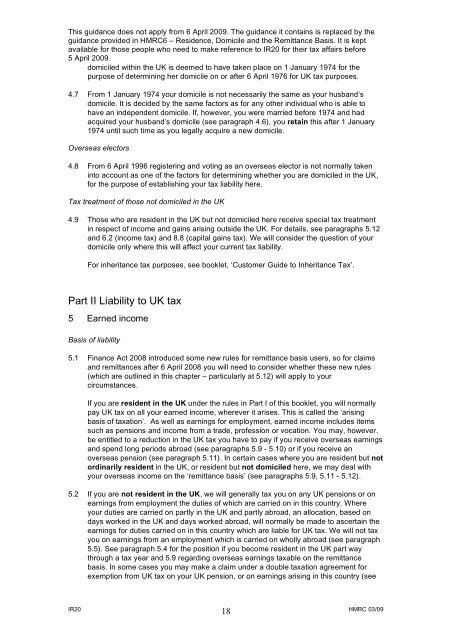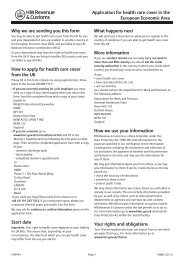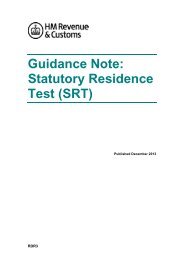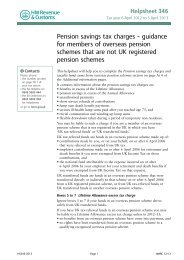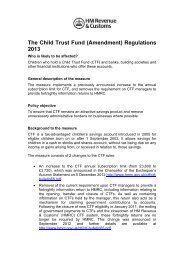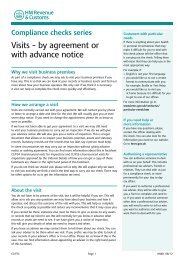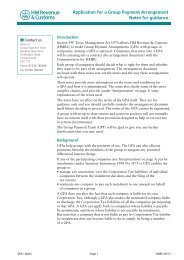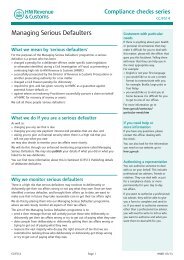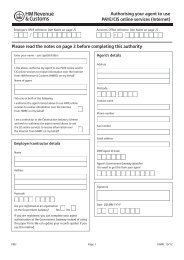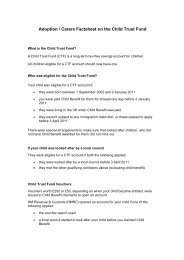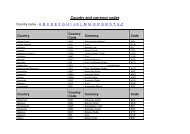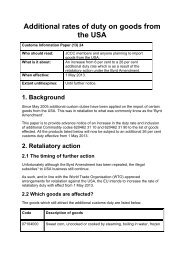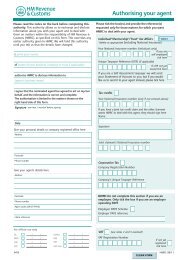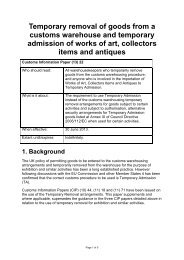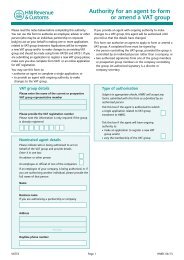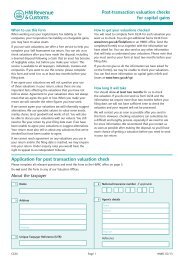IR20 - Residents and non-residents liability to tax in the United ...
IR20 - Residents and non-residents liability to tax in the United ...
IR20 - Residents and non-residents liability to tax in the United ...
Create successful ePaper yourself
Turn your PDF publications into a flip-book with our unique Google optimized e-Paper software.
This guidance does not apply from 6 April 2009. The guidance it conta<strong>in</strong>s is replaced by <strong>the</strong><br />
guidance provided <strong>in</strong> HMRC6 – Residence, Domicile <strong>and</strong> <strong>the</strong> Remittance Basis. It is kept<br />
available for those people who need <strong>to</strong> make reference <strong>to</strong> <strong>IR20</strong> for <strong>the</strong>ir <strong>tax</strong> affairs before<br />
5 April 2009.<br />
domiciled with<strong>in</strong> <strong>the</strong> UK is deemed <strong>to</strong> have taken place on 1 January 1974 for <strong>the</strong><br />
purpose of determ<strong>in</strong><strong>in</strong>g her domicile on or after 6 April 1976 for UK <strong>tax</strong> purposes.<br />
4.7 From 1 January 1974 your domicile is not necessarily <strong>the</strong> same as your husb<strong>and</strong>’s<br />
domicile. It is decided by <strong>the</strong> same fac<strong>to</strong>rs as for any o<strong>the</strong>r <strong>in</strong>dividual who is able <strong>to</strong><br />
have an <strong>in</strong>dependent domicile. If, however, you were married before 1974 <strong>and</strong> had<br />
acquired your husb<strong>and</strong>’s domicile (see paragraph 4.6), you reta<strong>in</strong> this after 1 January<br />
1974 until such time as you legally acquire a new domicile.<br />
Overseas elec<strong>to</strong>rs<br />
4.8 From 6 April 1996 register<strong>in</strong>g <strong>and</strong> vot<strong>in</strong>g as an overseas elec<strong>to</strong>r is not normally taken<br />
<strong>in</strong><strong>to</strong> account as one of <strong>the</strong> fac<strong>to</strong>rs for determ<strong>in</strong><strong>in</strong>g whe<strong>the</strong>r you are domiciled <strong>in</strong> <strong>the</strong> UK,<br />
for <strong>the</strong> purpose of establish<strong>in</strong>g your <strong>tax</strong> <strong>liability</strong> here.<br />
Tax treatment of those not domiciled <strong>in</strong> <strong>the</strong> UK<br />
4.9 Those who are resident <strong>in</strong> <strong>the</strong> UK but not domiciled here receive special <strong>tax</strong> treatment<br />
<strong>in</strong> respect of <strong>in</strong>come <strong>and</strong> ga<strong>in</strong>s aris<strong>in</strong>g outside <strong>the</strong> UK. For details, see paragraphs 5.12<br />
<strong>and</strong> 6.2 (<strong>in</strong>come <strong>tax</strong>) <strong>and</strong> 8.8 (capital ga<strong>in</strong>s <strong>tax</strong>). We will consider <strong>the</strong> question of your<br />
domicile only where this will affect your current <strong>tax</strong> <strong>liability</strong>.<br />
For <strong>in</strong>heritance <strong>tax</strong> purposes, see booklet, ‘Cus<strong>to</strong>mer Guide <strong>to</strong> Inheritance Tax’.<br />
Part II Liability <strong>to</strong> UK <strong>tax</strong><br />
5 Earned <strong>in</strong>come<br />
Basis of <strong>liability</strong><br />
5.1 F<strong>in</strong>ance Act 2008 <strong>in</strong>troduced some new rules for remittance basis users, so for claims<br />
<strong>and</strong> remittances after 6 April 2008 you will need <strong>to</strong> consider whe<strong>the</strong>r <strong>the</strong>se new rules<br />
(which are outl<strong>in</strong>ed <strong>in</strong> this chapter – particularly at 5.12) will apply <strong>to</strong> your<br />
circumstances.<br />
If you are resident <strong>in</strong> <strong>the</strong> UK under <strong>the</strong> rules <strong>in</strong> Part I of this booklet, you will normally<br />
pay UK <strong>tax</strong> on all your earned <strong>in</strong>come, wherever it arises. This is called <strong>the</strong> ‘aris<strong>in</strong>g<br />
basis of <strong>tax</strong>ation’. As well as earn<strong>in</strong>gs for employment, earned <strong>in</strong>come <strong>in</strong>cludes items<br />
such as pensions <strong>and</strong> <strong>in</strong>come from a trade, profession or vocation. You may, however,<br />
be entitled <strong>to</strong> a reduction <strong>in</strong> <strong>the</strong> UK <strong>tax</strong> you have <strong>to</strong> pay if you receive overseas earn<strong>in</strong>gs<br />
<strong>and</strong> spend long periods abroad (see paragraphs 5.9 - 5.10) or if you receive an<br />
overseas pension (see paragraph 5.11). In certa<strong>in</strong> cases where you are resident but not<br />
ord<strong>in</strong>arily resident <strong>in</strong> <strong>the</strong> UK, or resident but not domiciled here, we may deal with<br />
your overseas <strong>in</strong>come on <strong>the</strong> ‘remittance basis’ (see paragraphs 5.9, 5.11 - 5.12).<br />
5.2 If you are not resident <strong>in</strong> <strong>the</strong> UK, we will generally <strong>tax</strong> you on any UK pensions or on<br />
earn<strong>in</strong>gs from employment <strong>the</strong> duties of which are carried on <strong>in</strong> this country. Where<br />
your duties are carried on partly <strong>in</strong> <strong>the</strong> UK <strong>and</strong> partly abroad, an allocation, based on<br />
days worked <strong>in</strong> <strong>the</strong> UK <strong>and</strong> days worked abroad, will normally be made <strong>to</strong> ascerta<strong>in</strong> <strong>the</strong><br />
earn<strong>in</strong>gs for duties carried on <strong>in</strong> this country which are liable for UK <strong>tax</strong>. We will not <strong>tax</strong><br />
you on earn<strong>in</strong>gs from an employment which is carried on wholly abroad (see paragraph<br />
5.5). See paragraph 5.4 for <strong>the</strong> position if you become resident <strong>in</strong> <strong>the</strong> UK part way<br />
through a <strong>tax</strong> year <strong>and</strong> 5.9 regard<strong>in</strong>g overseas earn<strong>in</strong>gs <strong>tax</strong>able on <strong>the</strong> remittance<br />
basis. In some cases you may make a claim under a double <strong>tax</strong>ation agreement for<br />
exemption from UK <strong>tax</strong> on your UK pension, or on earn<strong>in</strong>gs aris<strong>in</strong>g <strong>in</strong> this country (see<br />
<strong>IR20</strong> 18<br />
HMRC 03/09


